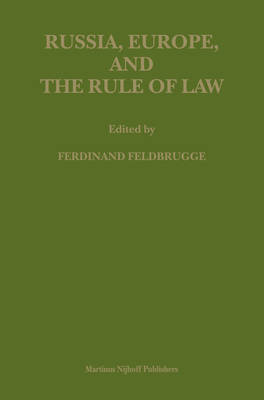
- Afhalen na 1 uur in een winkel met voorraad
- Gratis thuislevering in België vanaf € 30
- Ruim aanbod met 7 miljoen producten
- Afhalen na 1 uur in een winkel met voorraad
- Gratis thuislevering in België vanaf € 30
- Ruim aanbod met 7 miljoen producten
Zoeken
Russia, Europe, and the Rule of Law
€ 308,45
+ 616 punten
Omschrijving
During the last two decades Russia has gone through a process of radical political and socio-economic transformation. The legal system has reflected the various stages of this process and has also been a major agent in moving it forward. The country is at a crossroads now. External observers are sharply divided in evaluating the performance and intentions of the Russian leadership. Russia itself is involved in finding out where it stands. What sort of federation does it want to be? How will it define its relationship to Europe and to its former sister republics? The answers to such questions fundamentally affect the future shape of Russian law. At the same time, existing legal structures may predetermine the course Russia will take.
Specificaties
Betrokkenen
- Uitgeverij:
Inhoud
- Aantal bladzijden:
- 223
- Taal:
- Engels
- Reeks:
- Reeksnummer:
- nr. 56
Eigenschappen
- Productcode (EAN):
- 9789004155336
- Verschijningsdatum:
- 29/11/2006
- Uitvoering:
- Hardcover
- Formaat:
- Genaaid
- Afmetingen:
- 166 mm x 247 mm
- Gewicht:
- 566 g

Alleen bij Standaard Boekhandel
+ 616 punten op je klantenkaart van Standaard Boekhandel
Beoordelingen
We publiceren alleen reviews die voldoen aan de voorwaarden voor reviews. Bekijk onze voorwaarden voor reviews.







